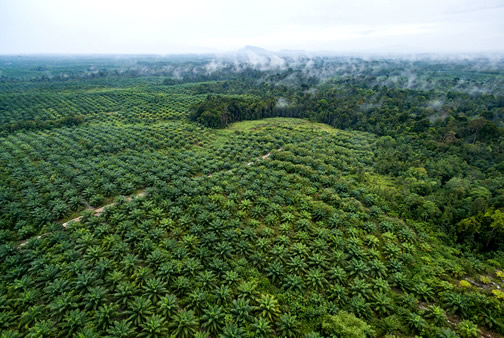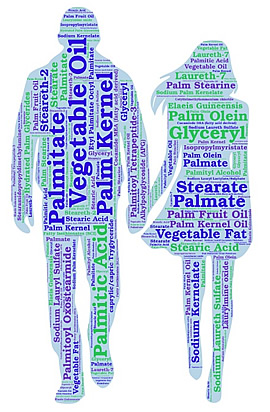Fat, consumerism and the wider environment
During the 20th century, we have also seen a ‘nutrition transition’ in our diet, going from one high in fibre and cereals to one dominated by sugar, trans-fats and animal-sourced foods.
Palm oil is one of the most common ingredients in supermarket foods today, being used as a preservative to extend shelf-life. Industrialisation thrives on fast-paced living and our work-dominated lives have made us ever more dependent on easy cook, ready-in-minutes foods.
Just as the ever-increasing demand for sugar had wider social and economic impacts that had a direct link to slavery, convenience foods and the palm oil they contain are causing severe environmental impacts. Huge areas of forest and natural habitats for wildlife are being destroyed and replaced by ever-expanding palm oil plantations required to keep up with consumer demand.
(Nanang Sujana/CIFOR)
It is estimated that almost half of all packaged supermarket goods contain palm oil, including margarine, peanut butter, ice cream, chocolate bars, bread, instant noodles and even toothpaste!
Perhaps one of the more unexpected consequences of palm oil consumption, in both foods and other cosmetic goods, are fatbergs. The most common ingredient of fatbergs is palmitic oil and this greasy, sticky substance is binding together waste products in our urban sewers, causing giant blockages!
Scientific analysis of the largest fatberg ever was undertaken by the Museum of London in 2018. The fatberg, affectionately known as Fatty McFatberg, the King of Fatbergs, was found in the sewers in Whitechapel and was the length of two Wembley football pitches, weighing the same as 11 double-decker buses! A chunk of it was put on display, bringing some unique challenges to the museum’s conservation team.
The good news is that despite the immediate health hazard Fatty McFatberg caused by blocking the sewers and potentially causing flooding, fatbergs can actually be removed and processed for biodiesel, providing a green outcome for quite an unpleasant environmental pollutant.
The skeletal evidence suggests that although obesity and fat have been ever present, obesity does appear to be on the increase thanks to the lifestyles that go hand in hand with industrialisation. And as we get older, we are more likely to put on weight, increasing our risk of diabetes. Unfortunately, that is only one of the problems we are seeing in our increasingly ageing population.
Next: Old age










